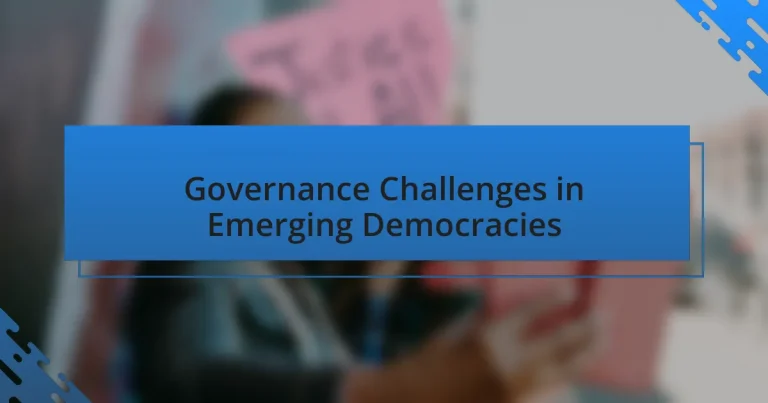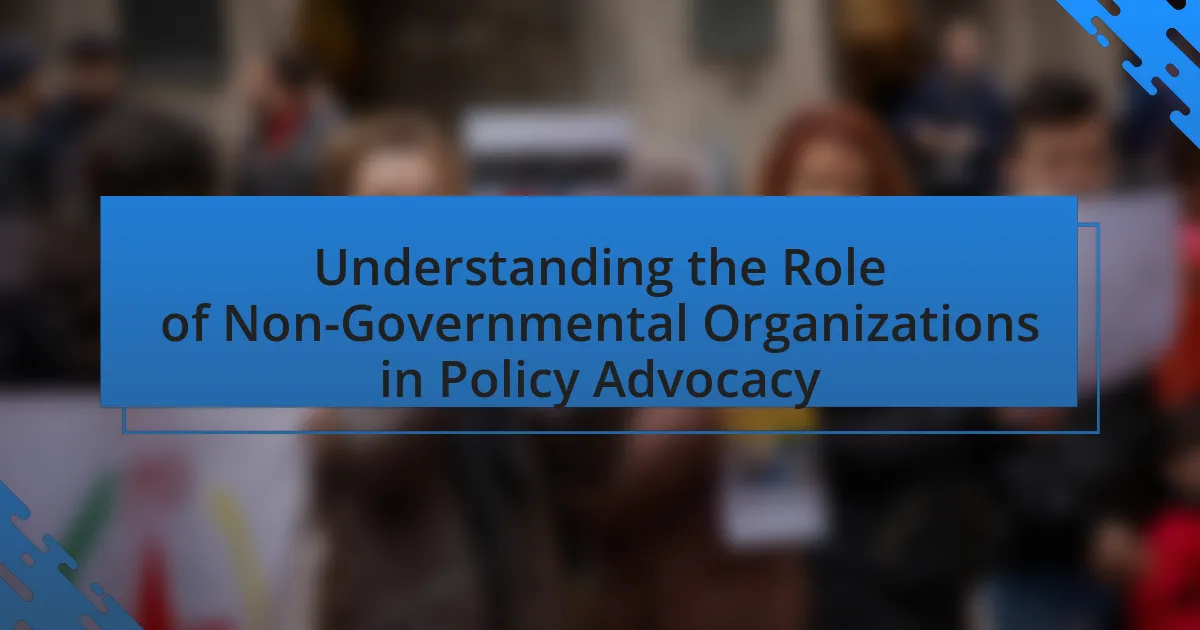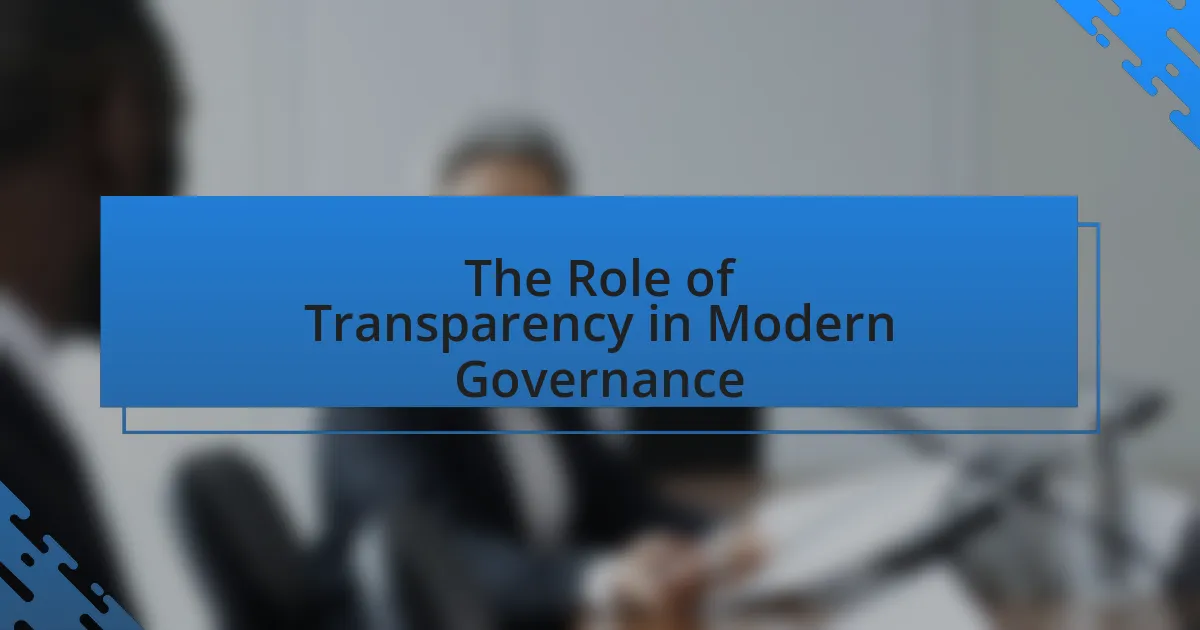The article examines the governance challenges faced by emerging democracies, highlighting key issues such as political instability, corruption, weak institutions, and limited civic engagement. It discusses how these challenges undermine effective governance and public trust, with a focus on the causes of political instability and the manifestations of corruption. The role of civil society in promoting accountability and citizen participation is emphasized, along with the impact of socio-economic factors like income inequality and education on governance. Additionally, the article outlines strategies for improving governance, including strengthening institutions, enhancing transparency, and fostering civic engagement, while also addressing the importance of electoral reform and international support in achieving democratic resilience.
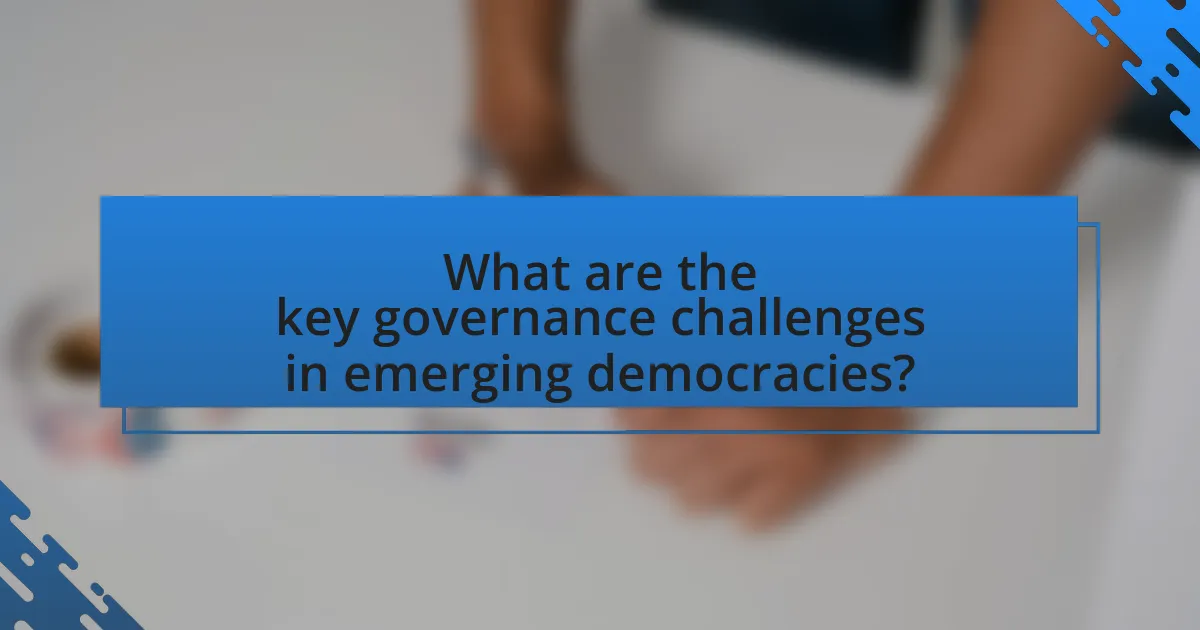
What are the key governance challenges in emerging democracies?
Key governance challenges in emerging democracies include political instability, corruption, weak institutions, and limited civic engagement. Political instability often arises from power struggles and lack of consensus among political factions, which can hinder effective governance. Corruption undermines public trust and diverts resources away from essential services, as evidenced by Transparency International’s Corruption Perceptions Index, which highlights high corruption levels in many emerging democracies. Weak institutions, characterized by inadequate legal frameworks and enforcement mechanisms, impede the rule of law and accountability. Limited civic engagement restricts citizen participation in governance processes, reducing the legitimacy of democratic institutions and policies. These challenges collectively hinder the development and consolidation of democratic governance in emerging democracies.
How do political instability and corruption impact governance?
Political instability and corruption severely undermine governance by eroding public trust and disrupting institutional effectiveness. Political instability leads to frequent changes in leadership and policy direction, which can create uncertainty and hinder long-term planning. For instance, countries like Venezuela have experienced significant governance challenges due to political turmoil, resulting in economic decline and social unrest. Corruption exacerbates these issues by diverting public resources for personal gain, weakening the rule of law, and fostering inequality. According to Transparency International, countries with high corruption levels often see lower government effectiveness and higher levels of poverty, as seen in nations like Nigeria, where corruption has stunted economic growth and development. Together, political instability and corruption create a vicious cycle that diminishes the capacity of governments to serve their citizens effectively.
What are the causes of political instability in emerging democracies?
Political instability in emerging democracies is primarily caused by weak institutions, socio-economic disparities, and ethnic or political divisions. Weak institutions often lead to ineffective governance, where laws are not enforced consistently, resulting in public disillusionment and unrest. Socio-economic disparities create tensions as marginalized groups may feel excluded from political processes, leading to protests and conflict. Additionally, ethnic or political divisions can exacerbate tensions, as competing groups vie for power, often resulting in violence or civil unrest. Historical examples include the Arab Spring, where weak governance and socio-economic grievances fueled widespread protests across multiple countries.
How does corruption manifest in these political systems?
Corruption in emerging democracies manifests primarily through bribery, nepotism, and embezzlement. Bribery occurs when public officials accept illicit payments to influence decisions, undermining the integrity of governance. For instance, Transparency International’s Corruption Perceptions Index consistently shows that many emerging democracies score low, indicating widespread bribery practices. Nepotism is prevalent when political leaders favor family and friends in government appointments, leading to inefficiency and a lack of meritocracy. Embezzlement, where officials misappropriate public funds for personal gain, further erodes trust in political institutions. According to the World Bank, corruption costs developing countries an estimated $1.26 trillion annually, highlighting the significant economic impact of these corrupt practices.
What role does civil society play in governance challenges?
Civil society plays a crucial role in addressing governance challenges by promoting accountability, transparency, and citizen participation. Organizations within civil society, such as NGOs and advocacy groups, often act as watchdogs, monitoring government actions and holding officials accountable for corruption and mismanagement. For instance, in countries like Brazil, civil society organizations have successfully mobilized public opinion against corruption, leading to significant political reforms. Additionally, civil society facilitates dialogue between citizens and the government, ensuring that diverse voices are heard in the decision-making process, which is essential for fostering democratic governance.
How can civil society organizations influence democratic processes?
Civil society organizations can influence democratic processes by advocating for policy changes, promoting civic engagement, and holding governments accountable. These organizations mobilize citizens to participate in the democratic process, thereby increasing voter turnout and public awareness of political issues. For instance, research by the World Bank indicates that civil society groups can enhance transparency and accountability in governance, leading to improved public trust in democratic institutions. Additionally, studies show that countries with active civil societies tend to have stronger democratic practices, as these organizations often serve as watchdogs that monitor government actions and promote human rights.
What challenges do civil society organizations face in emerging democracies?
Civil society organizations in emerging democracies face significant challenges, including limited funding, government repression, and lack of public trust. Limited funding often arises from unstable economic conditions and reduced international support, which hampers their operational capacity. Government repression manifests through restrictive laws, harassment, and intimidation, undermining their ability to advocate for rights and engage in policy-making. Additionally, a lack of public trust can stem from historical grievances or perceived ineffectiveness, making it difficult for these organizations to mobilize community support and achieve their objectives. These challenges collectively hinder the effectiveness and sustainability of civil society organizations in promoting democratic governance.
How does the rule of law affect governance in emerging democracies?
The rule of law significantly enhances governance in emerging democracies by establishing a framework that promotes accountability, transparency, and the protection of fundamental rights. This legal framework ensures that government actions are subject to law, thereby reducing arbitrary decision-making and fostering public trust. For instance, countries like Ghana and Indonesia have demonstrated that adherence to the rule of law can lead to improved political stability and economic growth, as evidenced by their increased foreign investment and citizen engagement in governance processes. Furthermore, the World Bank has reported that nations with strong rule of law indicators experience lower levels of corruption, which is crucial for the effective functioning of democratic institutions.
What are the implications of weak legal frameworks?
Weak legal frameworks lead to significant governance challenges in emerging democracies, including increased corruption, lack of accountability, and diminished public trust in institutions. These frameworks often fail to provide adequate protections for human rights and property, resulting in social instability and economic inefficiency. For instance, according to the World Bank, countries with weak legal systems experience higher levels of corruption, which can deter foreign investment and hinder economic growth. Additionally, weak legal frameworks can exacerbate inequalities, as marginalized groups may lack access to justice, further entrenching social divisions.
How does access to justice impact citizen trust in governance?
Access to justice significantly enhances citizen trust in governance by ensuring that individuals can seek redress and hold authorities accountable. When citizens perceive that they have equitable access to legal resources and fair judicial processes, their confidence in governmental institutions increases. Research indicates that in countries with robust legal frameworks and accessible judicial systems, such as those highlighted in the World Justice Project’s Rule of Law Index, citizens report higher levels of trust in their governments. This correlation is evident as access to justice fosters transparency, reduces corruption, and promotes the rule of law, all of which are critical components in building trust between citizens and their governing bodies.
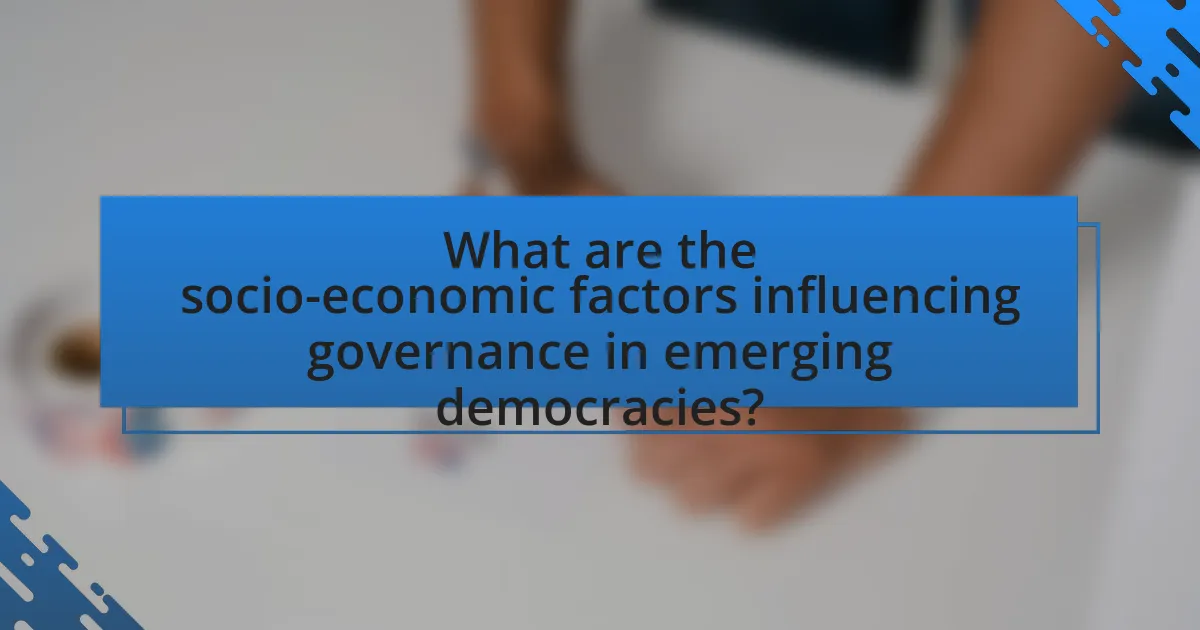
What are the socio-economic factors influencing governance in emerging democracies?
Socio-economic factors influencing governance in emerging democracies include income inequality, education levels, economic development, and social capital. Income inequality often leads to political instability, as marginalized groups may feel disenfranchised and less likely to participate in governance. For instance, the Gini coefficient, which measures income inequality, has been linked to political unrest in various countries. Education levels directly impact civic engagement and the ability of citizens to hold their governments accountable; higher education correlates with increased political participation. Economic development fosters a stable environment for governance, as countries with stronger economies tend to have more resources for public services and infrastructure, which can enhance governmental effectiveness. Lastly, social capital, defined as the networks and relationships within a community, plays a crucial role in fostering trust and cooperation among citizens, which is essential for effective governance. Studies have shown that higher levels of social capital can lead to more responsive and accountable governance in emerging democracies.
How do economic disparities affect political stability?
Economic disparities significantly undermine political stability by fostering social unrest and eroding trust in governmental institutions. When wealth is concentrated among a small elite, large segments of the population may feel marginalized and disenfranchised, leading to increased tensions and potential conflict. For instance, research by the International Monetary Fund indicates that countries with high income inequality experience more frequent political instability, as seen in the Arab Spring, where economic grievances fueled widespread protests against authoritarian regimes. This correlation highlights that economic disparities can create an environment ripe for political upheaval, as citizens demand greater equity and representation.
What is the relationship between poverty and governance challenges?
Poverty significantly exacerbates governance challenges by undermining state capacity and legitimacy. When a population experiences high levels of poverty, it often leads to increased social unrest, weakened institutions, and corruption, which further complicate governance. For instance, according to the World Bank, countries with higher poverty rates tend to have less effective governance structures, as limited resources hinder the government’s ability to provide essential services and maintain order. This creates a cycle where poor governance perpetuates poverty, making it difficult for emerging democracies to stabilize and develop effectively.
How does unemployment contribute to political unrest?
Unemployment significantly contributes to political unrest by creating economic instability and social dissatisfaction among the population. High unemployment rates lead to increased poverty, reduced consumer spending, and a general sense of hopelessness, which can fuel frustration and anger towards the government. For instance, during the Arab Spring, countries like Tunisia and Egypt experienced widespread protests partly due to soaring youth unemployment, which reached 30% in Tunisia in 2010. This economic discontent often manifests in protests, riots, and calls for political change, as citizens demand better job opportunities and government accountability.
What impact does education have on governance and civic engagement?
Education significantly enhances governance and civic engagement by fostering informed citizenry and promoting active participation in democratic processes. An educated population is more likely to understand their rights and responsibilities, leading to increased voter turnout and civic involvement. For instance, studies show that higher levels of education correlate with greater political participation; individuals with a college degree are 20% more likely to vote compared to those without. Furthermore, education equips citizens with critical thinking skills necessary for evaluating government policies and holding leaders accountable, thereby strengthening democratic institutions.
How does education level correlate with political participation?
Higher education levels correlate positively with increased political participation. Individuals with higher education tend to engage more in voting, activism, and civic activities. Research indicates that educated citizens are more likely to understand political issues, feel empowered to participate, and possess the skills necessary for effective engagement. For instance, a study by the Pew Research Center found that 62% of college graduates reported voting in the last election compared to only 38% of those with a high school diploma. This trend highlights the significant impact of education on fostering active citizenship and participation in democratic processes.
What role does media literacy play in shaping public opinion?
Media literacy plays a crucial role in shaping public opinion by enabling individuals to critically analyze and evaluate media messages. This critical analysis fosters informed decision-making and enhances civic engagement, which is essential in emerging democracies where misinformation can easily spread. Studies indicate that higher levels of media literacy correlate with greater skepticism towards biased information, leading to more balanced public discourse. For instance, research by the Pew Research Center shows that individuals with strong media literacy skills are more likely to recognize and question misleading news, thereby influencing their opinions and actions in a democratic context.
How do demographic changes influence governance challenges?
Demographic changes significantly influence governance challenges by altering the composition and needs of the population, which can strain existing political and administrative systems. For instance, an aging population may increase demand for healthcare and pension services, while a youth bulge can lead to higher unemployment rates and calls for job creation. According to the United Nations, by 2050, the global population aged 60 years or older is expected to reach 2.1 billion, which will require governments to adapt policies to address the needs of older citizens. Additionally, migration patterns can shift demographic balances, leading to social tensions and challenges in integration, as seen in various European countries facing an influx of refugees. These demographic shifts necessitate responsive governance frameworks that can effectively manage diverse and evolving societal needs.
What are the effects of urbanization on political dynamics?
Urbanization significantly alters political dynamics by shifting power structures, influencing policy priorities, and changing voter behavior. As populations concentrate in urban areas, local governments often gain increased authority and resources, leading to a decentralization of power from national to local levels. This shift can result in more responsive governance, as urban leaders may prioritize issues like housing, transportation, and public services that directly affect their constituents.
Moreover, urbanization tends to create diverse populations, which can lead to the emergence of new political movements and parties that reflect the interests of various demographic groups. For instance, in many emerging democracies, urban centers have become hotspots for social movements advocating for rights and reforms, as seen in the Arab Spring where urban youth mobilized for political change.
Additionally, urbanization can enhance political engagement, as higher population density often correlates with increased access to information and civic participation. Studies indicate that urban residents are more likely to vote and engage in political discourse compared to their rural counterparts, thereby influencing electoral outcomes and policy decisions.
In summary, urbanization reshapes political dynamics by redistributing power, fostering new political identities, and enhancing civic engagement, which are critical factors in the governance challenges faced by emerging democracies.
How does youth engagement shape the future of governance?
Youth engagement significantly shapes the future of governance by fostering democratic participation and influencing policy decisions. Engaged youth bring fresh perspectives and innovative ideas, which can lead to more responsive and accountable governance. For instance, the 2011 Arab Spring demonstrated how youth mobilization through social media led to significant political changes in several countries, highlighting the power of young voices in shaping governance. Additionally, studies show that countries with higher youth participation in political processes tend to have more robust democratic institutions and lower levels of corruption, as evidenced by research from the United Nations Development Programme, which emphasizes the importance of youth in promoting good governance.
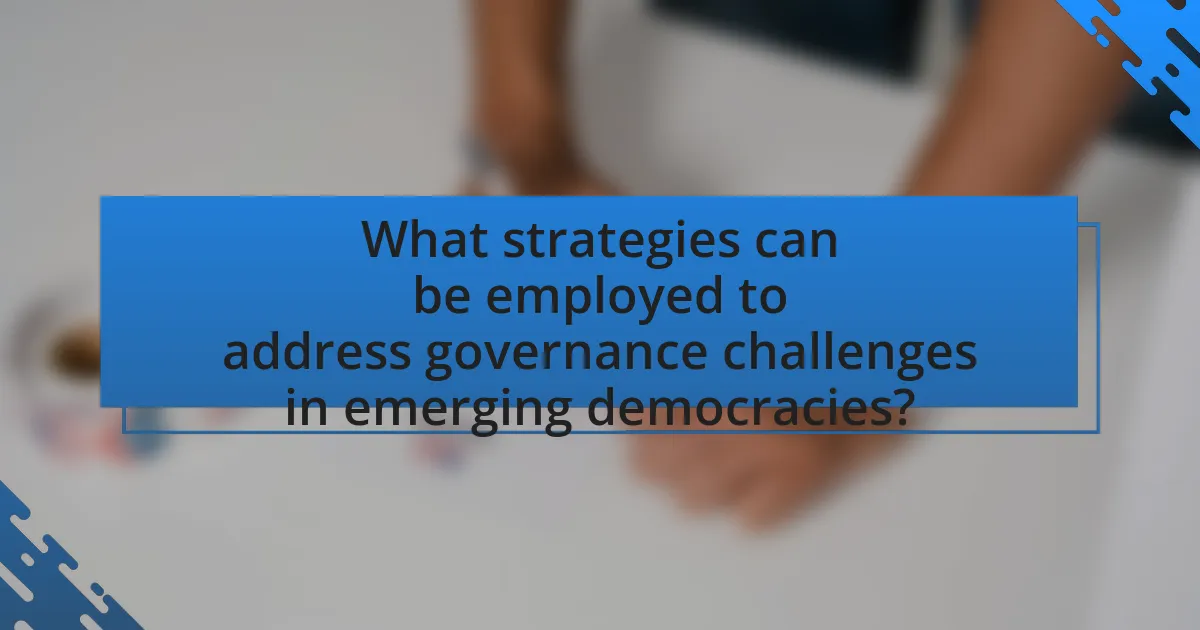
What strategies can be employed to address governance challenges in emerging democracies?
Strategies to address governance challenges in emerging democracies include strengthening institutions, promoting civic engagement, and enhancing transparency and accountability. Strengthening institutions involves establishing independent judicial systems and effective law enforcement agencies to uphold the rule of law, as seen in countries like Ghana, where judicial reforms have improved public trust. Promoting civic engagement encourages citizen participation in decision-making processes, which can be observed in Tunisia, where grassroots movements have led to significant political reforms. Enhancing transparency and accountability can be achieved through the implementation of anti-corruption measures and open government initiatives, as demonstrated by initiatives in countries like Indonesia, which have successfully reduced corruption levels through public reporting mechanisms. These strategies collectively contribute to more resilient governance structures in emerging democracies.
How can international organizations support governance improvements?
International organizations can support governance improvements by providing technical assistance, facilitating capacity building, and promoting best practices in democratic governance. For instance, organizations like the United Nations and the World Bank offer expertise and resources to help countries develop effective institutions and legal frameworks. According to a 2020 report by the United Nations Development Programme, countries that engaged with international organizations saw a 30% increase in governance effectiveness scores over five years. This demonstrates that structured support from international entities can lead to measurable improvements in governance.
What types of assistance can be provided to strengthen institutions?
Assistance to strengthen institutions includes capacity building, technical support, financial aid, and policy development. Capacity building involves training personnel and enhancing skills within institutions to improve efficiency and effectiveness. Technical support provides expertise in areas such as governance, legal frameworks, and public administration, which are crucial for institutional development. Financial aid, often from international organizations, helps institutions implement reforms and sustain operations. Policy development assistance focuses on creating frameworks that promote transparency, accountability, and citizen engagement, which are essential for robust governance. These types of assistance have been shown to improve institutional resilience and effectiveness in various contexts, as evidenced by successful reforms in countries like Ghana and Indonesia, where targeted support led to enhanced governance outcomes.
How can international partnerships enhance democratic governance?
International partnerships can enhance democratic governance by providing resources, expertise, and frameworks that support democratic institutions and processes. These partnerships often facilitate knowledge sharing and best practices, which can strengthen electoral systems, promote rule of law, and enhance civil society engagement. For instance, organizations like the United Nations and the European Union have implemented programs that assist emerging democracies in developing transparent governance structures and fostering political accountability. Research indicates that countries engaged in international partnerships tend to experience improved governance indicators, such as reduced corruption and increased political participation, as evidenced by the World Bank’s Governance Indicators, which show a correlation between international aid and governance improvements in various nations.
What role does electoral reform play in improving governance?
Electoral reform plays a crucial role in improving governance by enhancing the integrity and inclusiveness of electoral processes. By implementing changes such as proportional representation, independent electoral commissions, and stricter campaign finance laws, electoral reform can reduce corruption, increase voter participation, and ensure that diverse voices are represented in government. For instance, countries like Germany and New Zealand have adopted proportional representation systems, leading to more equitable representation and stable coalition governments, which have been linked to higher levels of public trust in governance. These reforms contribute to a more accountable political system, ultimately fostering better governance in emerging democracies.
How can electoral systems be designed to promote fairness?
Electoral systems can be designed to promote fairness by implementing proportional representation, which ensures that the number of seats a party receives in the legislature is closely aligned with the percentage of votes they obtain. This approach contrasts with winner-takes-all systems, which can marginalize smaller parties and distort voter preferences. Countries like Germany and New Zealand have successfully utilized mixed-member proportional systems, allowing for both direct representation and proportionality, thereby enhancing fairness in electoral outcomes. Research indicates that proportional representation can lead to higher voter satisfaction and increased political participation, as evidenced by studies from the International Institute for Democracy and Electoral Assistance, which highlight the positive correlation between proportional systems and democratic engagement.
What measures can be taken to ensure free and fair elections?
To ensure free and fair elections, implementing independent electoral commissions is essential. These commissions oversee the electoral process, ensuring transparency and impartiality. For instance, countries like Canada and Germany have established independent bodies that manage elections, which has led to high levels of public trust in electoral outcomes. Additionally, enforcing strict campaign finance laws can prevent undue influence from wealthy donors and organizations, as seen in the United States where the Federal Election Commission regulates campaign contributions. Voter education initiatives also play a crucial role, as informed voters are less susceptible to manipulation; studies show that voter education programs can significantly increase participation and awareness. Lastly, international observers can provide oversight and credibility to the electoral process, as demonstrated in various elections monitored by organizations like the Organization for Security and Co-operation in Europe (OSCE), which has reported on the importance of such oversight in maintaining electoral integrity.
What best practices can emerging democracies adopt for effective governance?
Emerging democracies can adopt several best practices for effective governance, including establishing strong institutions, promoting transparency, and ensuring citizen participation. Strong institutions, such as an independent judiciary and accountable law enforcement, provide the framework for upholding the rule of law and protecting rights. Transparency in government operations, achieved through open data initiatives and anti-corruption measures, fosters trust and accountability among citizens. Additionally, encouraging citizen participation in decision-making processes, through mechanisms like public consultations and participatory budgeting, enhances democratic legitimacy and responsiveness. These practices are supported by evidence from various studies, such as the World Bank’s Governance Indicators, which show that countries with robust institutions and high levels of transparency tend to experience better governance outcomes.
How can transparency and accountability be enhanced in governance?
Transparency and accountability in governance can be enhanced through the implementation of open data initiatives and robust regulatory frameworks. Open data initiatives allow citizens access to government information, fostering public scrutiny and engagement, which has been shown to improve trust in government. For instance, the Open Government Partnership, involving over 75 countries, promotes transparency by encouraging governments to publish data on budgets, expenditures, and decision-making processes. Additionally, regulatory frameworks that enforce anti-corruption measures and establish clear accountability mechanisms, such as independent audits and whistleblower protections, have proven effective in holding public officials accountable. Research indicates that countries with strong accountability measures experience lower levels of corruption and higher public satisfaction with governance.
What are the key elements of successful governance frameworks?
The key elements of successful governance frameworks include transparency, accountability, participation, rule of law, and responsiveness. Transparency ensures that information is accessible to stakeholders, fostering trust and informed decision-making. Accountability mechanisms hold leaders responsible for their actions, which is crucial for maintaining public confidence. Participation allows citizens to engage in the governance process, enhancing legitimacy and inclusivity. The rule of law guarantees that laws are applied fairly and consistently, protecting individual rights and promoting justice. Responsiveness ensures that government actions align with the needs and concerns of the populace, facilitating effective governance. These elements are supported by various studies, such as the World Bank’s Governance Matters report, which highlights the correlation between these factors and improved governance outcomes in emerging democracies.
What practical steps can citizens take to engage in governance?
Citizens can engage in governance by participating in local elections, attending town hall meetings, and joining civic organizations. These actions allow individuals to voice their opinions, influence decision-making, and hold elected officials accountable. For instance, voter turnout in local elections can significantly impact community policies; in the 2020 U.S. elections, local races saw a turnout increase of over 20% compared to previous years, demonstrating the power of citizen participation. Additionally, attending town hall meetings provides a platform for citizens to directly interact with their representatives, fostering transparency and responsiveness in governance.
